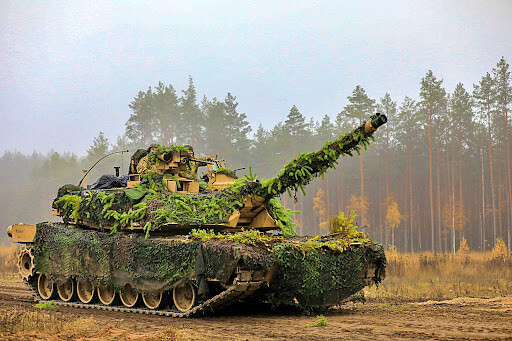
Vilnius, Lithuania – In a significant move signaling heightened concerns over neighboring Russia's aggressive posture, Lithuania, one of the three Baltic states, plans to dramatically increase its defense spending to an unprecedented 5.5% of its Gross Domestic Product (GDP) next year. This ambitious target, aiming to be the highest among NATO member states, underscores the nation's determination to bolster its deterrence capabilities in the face of ongoing threats, particularly following Russia's full-scale invasion of Ukraine.
Dovilė Šakalienė, Lithuania's Deputy Minister of National Defence, articulated this commitment during a recent interview with Nikkei in Tokyo. "The direction that Lithuania will bear more of the defense burden is the right one," Šakalienė emphasized. She further warned, "Russia's military spending continues to increase to over 10% of its GDP, and Russia has greater ambitions than it does for Ukraine," highlighting the urgent need for enhanced deterrence.
Lithuania's defense budget has seen a sharp escalation since the outbreak of the war in Ukraine. Before the conflict, defense expenditure hovered around 2% of GDP. This figure was raised to 4% in the current year and is projected to increase by another 1.5 percentage points in 2026, reaching the 5.5% target. This proactive stance aligns with pressures from President Donald Trump's administration, which advocated for NATO member states to raise their defense spending targets from the traditional 2% to 5% of GDP.
In 2024, Lithuania's defense budget stood at $2.3 billion (approximately 3.1315 trillion Korean Won). At 4% of GDP, this already places Lithuania's defense spending as the sixth-highest among NATO allies in terms of GDP percentage. Poland leads the pack at 4.1% and has been notably investing in large-scale acquisitions of South Korean-made weaponry and equipment.
The significant increase in defense allocation will be channeled into several critical areas. Šakalienė specified that the augmented funds would be primarily dedicated to the modernization of the Lithuanian armed forces and the acquisition of weapons and ammunition. This includes investments in advanced military technologies, air defense systems, and improved training for its personnel, ensuring that Lithuania's military is well-equipped to face contemporary threats.
Funding for this defense expenditure boost is expected to come from a combination of sources. Alongside planned tax reforms within Lithuania, the nation anticipates receiving support from a newly established rearmament fund by the European Union (EU). This EU initiative aims to facilitate joint procurement and production of defense equipment among member states, further strengthening Europe's collective defense capabilities.
With a population of approximately 2.9 million, Lithuania is relatively small but is the most populous of the three Baltic states. Its strategic geographical location makes it a crucial frontline state in NATO's confrontation with Russia. Lithuania shares borders with both Russia's ally, Belarus, and the Russian exclave of Kaliningrad, a heavily militarized region on the Baltic Sea. This proximity to potential flashpoints underscores the urgency of Lithuania's defense buildup.
Adding to the regional security landscape, Germany recently began its first independent overseas deployment of troops to Lithuania since World War II. This deployment, initiated last month, is planned to expand to a robust force of 5,000 personnel by 2027. This German military presence, an integral part of NATO's enhanced Forward Presence (eFP) battlegroups in the Baltics, further reinforces the alliance's commitment to the collective defense of its eastern flank and serves as a powerful deterrent against any potential aggression.
Lithuania's decision to significantly ramp up its defense spending reflects a broader trend among Eastern European NATO members who perceive an escalating threat from Russia. This move is not merely about meeting alliance targets but is a fundamental recalculation of security needs in a volatile geopolitical environment, prioritizing national defense and collective security within the NATO framework.
[Copyright (c) Global Economic Times. All Rights Reserved.]






























